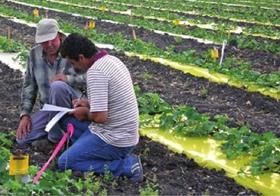
A conference arranged by the Swedish European Union presidency, designed to discuss so-called 'climate smart' food, offered an opportunity for the European fresh produce sector to highlight the fact that fruit and vegetable production already fits into this bracket.
Arranged in the lead-up to UN Climate Change Conference in Copenhagen, Denmark, the event saw Freshfel Europe and other representatives from the fruit and vegetable sector join 200 participants in travelling to Lund in Sweden to discuss climate smart options.
In the presentation on fruit and vegetables, an industry representative highlighted the fact that fresh produce consumption was already part of a climate smart diet, with on average most fresh produce outperforming other food products when it came to overall carbon footprint.
According to research figures gathered in a 2002 study, fresh fruit production (3.40kg of CO2 per kg) and fresh green vegetable production (1.67kg of CO2 per kg) outperformed other sectors such as beef (19.30kg of CO2 per kg), pork (13.89kg of CO2 per kg), cheese (13.86kg of CO2 per kg) and coffee (113.62kg of CO2 per kg).
However, the sector acknowledged that improvements were possible at all levels of the supply chain, with total food production from farm to fork estimated to account for 25-30 per cent of total consumption related to greenhouse gas emissions.
Meanwhile, the conference debate cast doubts over the feasibility and effectiveness of certain carbon footprint labelling schemes.
'The relevance of environmental labels in general remains uncertain as they might be too complex for consumers which are mostly not interested and do not have enough time to consider complex messages,' said Frederic Rosseneu, food quality advisor at Freshfel Europe. 'For operators there is also the complexity of the supply chain and associated costs.
'The carbon and environmental footprinting tools will rather help the sector to identify problem areas and solutions and to assist clients and retailers to meet their corporate social responsibility goals, as well as support certain marketing initiatives,' he added.
Freshfel general delegate Philippe Binard said that he was pleased that, at the conclusion of the debate, both consumer and environmental groups were calling for increased fruit and vegetable consumption as an easy and healthy way to address climate change.
'We are glad other stakeholders acknowledge the fact that fresh produce is part of the solution in tackling climate change,' he said. 'Our product is indeed not only an essential contribution for improving the health of consumers but also moving towards a better environment.'






No comments yet